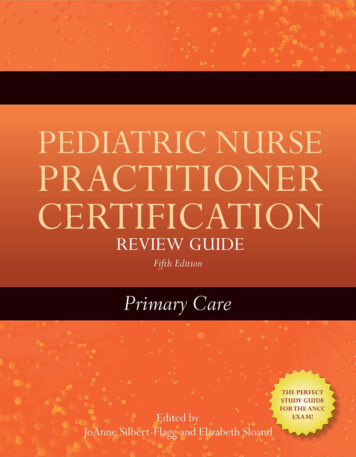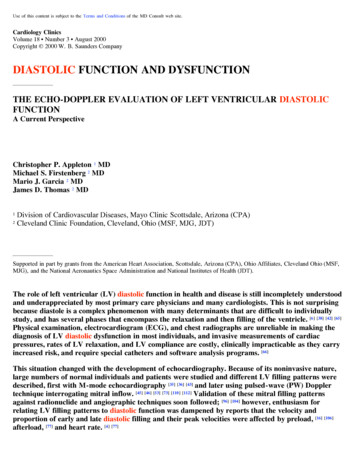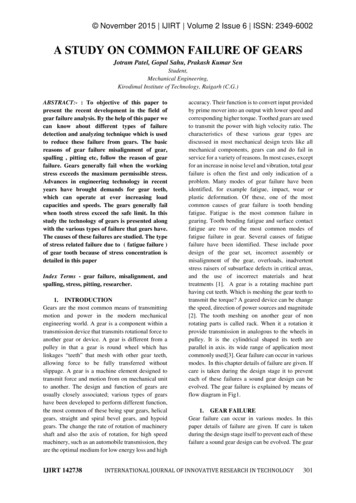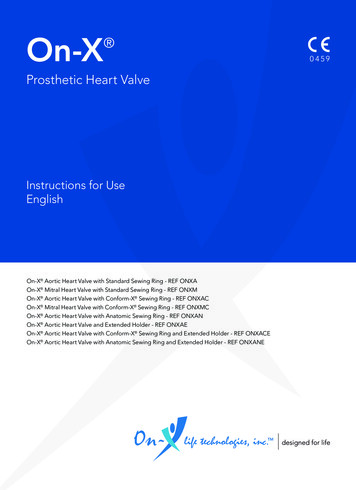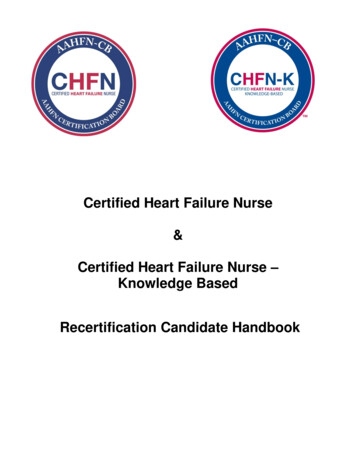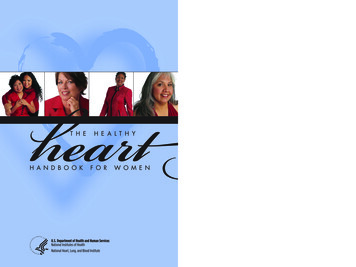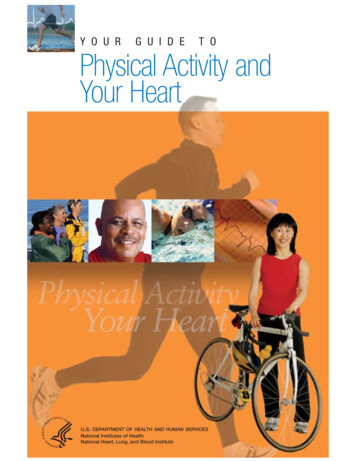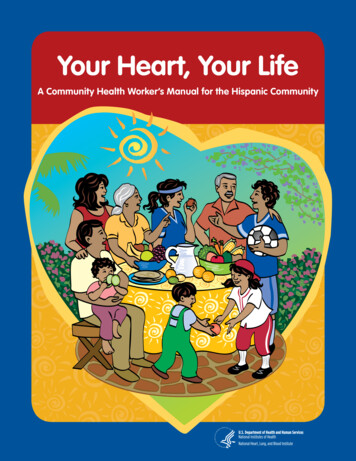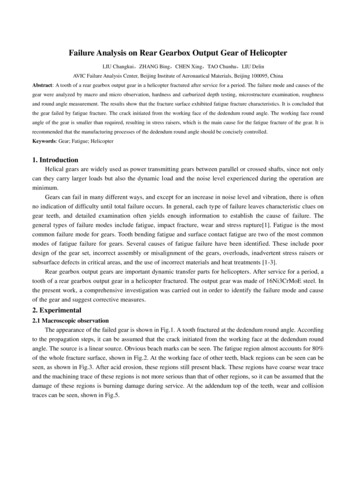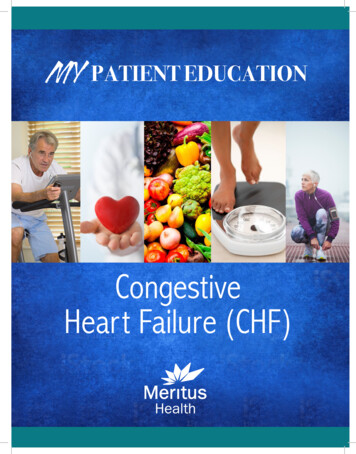
Transcription
MY PATIENT EDUCATIONCongestiveHeart Failure (CHF)Meritus Health1
TA B L E O F C O N T E N T SWhat is Heart Failure, Causes, Symptoms.3Echocardiography Test And Ejection Fraction. 4Managing my Congestive Heart Failure at Home. 5Watching your Weight.6Daily Weight Chart. 7Stay Active to be Healthy.8Sodium Content of Common Foods.9Sodium Salt.9How to Follow a Low Salt Diet.10Reading Food Labels .13A Word About Fat, Saturated Fat, Trans Fat, and Cholesterol.13Tips for Shopping and Eating Out.14Fluids Intake, Caffeine and Alcohol and Tips for a Dry Mouth.14Medications. 15Medication Safety Tips.16Tobacco.17Planning for the Future – Advanced Directives.18Managing my Congestive Heart Failure at Home Pullout. 19Resources.21Discrimination Policy.222Meritus Health
W H AT I S H E A R T FA I LU R E ?Your heart pumps blood to all parts of the body. Heart failure does not mean thatyour heart has stopped working. Fluid can build up in your lungs and other areasof your body when your heart is not pumping normally. When your heart fails topump blood at a rate required to meet the body’s needs, you may have difficultybreathing, feel tired and experience swelling in your legs and feet.W H AT C AU S E SH E A R T FA I LU R E ?Heart failure is usually caused by otherproblems that make the heart functioninadequately, both detectable and nondetectable. These problems can include: Coronary artery diseaseS Y M P TO M S Weight gain of 2 pounds in24 hours or 3 to 5 poundsin a week New shortness of breath(trouble breathing) Abnormal heart valves Waking up with a cough orconstant cough Heart muscle disorder (cardiomyopathy) Being more tired or weak Severe lung disease Swollen legs or feet High blood pressure Low red blood cell count Abnormal heart rhythm COPD Stomach fullness Nausea or vomiting Obesity Sleep apnea Kidney failureMeritus Health3
ECHOCARDIOGRAPHY TEST ANDE J E C T I O N F R AC T I O NEchocardiography (EK-o-kar-de-OG-ra-fee), or echo, is a painless test that usessound waves to create pictures of your heart and is commonly ordered todetermine a diagnosis. The test gives your doctor information about the size andshape of your heart and how well your heart’s chambers and valves are working.It can show areas of the heart muscle that aren’t pumping normally. It may alsoshow possible blood clots inside the heart or fluid in the sac around the heart(pericardium). An echo can also measure your ejection fraction which is theamount of blood that is pumped out of the heart chamber with each beat. Theejection fraction is reported as a percentage. A normal ejection fraction is 50-70%.The ejection fraction determines your type of heart failure. Ask your doctor whatyour ejection fraction is and if it is improving with heart failure treatment.4Meritus Health
M A N AG I N G M Y C O N G E S T I V E H E A R T FA I LU R E ( C H F ) AT H O M EGreen Zone –I am having a GOOD day! Breathe easily and have energy No swelling in your ankles or legs No weight gain No decrease in your ability tomaintain a normal activity levelActions to continue: Your symptoms are under control Continue your usual activities Take your medicine every day Weigh yourself every day in themorning after emptying yourbladder and keep a record of thesedaily weights Follow a low salt diet Keep all physician appointmentsYellow Zone –I am having a BAD day! More short of breath than usual,especially when lying flat Increased fatigue, weakness andmore tired Dry, nagging cough/night timecoughing Weight gain of 2 pounds in 24hours OR 3 to 5 pounds in 1 week Feet, ankles, legs or stomachswelling more than usual (shoes orpants may be tight) Dizziness or lightheadedness whenyou rise Nausea or lack of appetite Irregular or rapid heartbeatActions to take: Your symptoms may indicate thatyou need an adjustment in yourmedications DO NOT WAIT and hope yoursymptoms improve Call your physicianPhysician NumberRed Zone –I am having a VERY BAD day! Severe shortness of breath Feel dizzy or faint Feel scared about not being able tobreathe Sudden or severe chest pain orpressure Frothy sputumActions to take: You need to be evaluated by aphysician right away! Call 911 Get to the nearest EmergencyRoomMeritus Health5
WATC H I N G YO U R W E I G H TOne possible early sign of heart failure is excess fluid. The extra fluid causesyou to gain weight. You can help by weighing yourself each day and looking forchanges.What do I need to do? Make sure you have a scaleat home. If you do not havea scale, let your nurse ordoctor know. Make sure you can readthe numbers clearly on thescale. Write down your weightevery day. Weigh yourself eachmorning at the same time- After urinating- Before eating or drinking- Same amount of clothing. Call your doctor if yougain 2 pounds in a day or3–5 pounds in a week.6Meritus Health
DA I LY W E I G H T C H A R T Weigh yourself everyday at the same time – Make sure the dial is set to zero before youin the morning after you empty your bladderstep on the scale.and before you eat breakfast is best. Record your weight below. Bring the log to all of your 2232425262728293031MonthMonthMonth MonthIf weight increases more than 2 pounds in a day or 3–5 pounds in a week, contact your nurse or yourphysician. If weight decreases more than 5 pounds within a week, contact your nurse or physician.Meritus Health7
S TAY AC T I V E TO B E H E A LT H YYour heart is a muscle and stayingactive can help your heart functionefficiently. It is important for everyoneto exercise on a regular basis. The heartis a muscle and must be exercised tostay healthy. Daily activity and exercisecan help you in the following ways: Make you feel less tired Improve your mood Reduce stress Help you lose or maintain your weight Lower your blood pressure Raise your HDL “good” cholesterol Lowers risk of recurrent heart failureand hospitalization.Do not do activities that require heavylifting such as shoveling snow withoutchecking with your doctor. If you areunable to walk, leg exercises usinglight weights or bands can be helpful toyou. These types of exercises preventyou from losing muscle mass. Lossof muscle mass increases your risk ofrecurrent heart failure.Check with your doctor if you feel likeyou want to exercise more than theguidelines allow. Wait at least one hourafter eating before exercising.WA L K I N G T I P S Start Slow – 10 minutes at a time is a great wayto get started. Make a Plan – Put walking on your calendar tomake sure you have time to walk. Walk Fast – Fast enough that you cannot sing,but are able to talk. Find a Buddy – Walk with a partner to help youstick to your walking plan and connect withothers. Walk Instead of Drive – Find a safe route to walkto work, school, the store or other places youwould normally drive. Change Your Scenery – Walk in a park or trailyou’ve never visited. Discover new places andhave fun!8Meritus HealthS E X UA L AC T I V I T YYou should be able tohave sex once yourheart failure symptomsare under control. Askyour doctor if it is okayfor you to resumesexual activity. It isbest for you to havesex when rested. Avoidhaving sex right aftereating a meal. If you feeluncomfortable or tiredduring sexual activity,stop and rest.
H O W TO F O L LO W A LO W S A LT ( S O D I U M ) D I E TL E S S T H A N 2 , 0 0 0 M G O F S O D I U M / DAY TOTA LSalt is sodium chloride. It retains water in our bodies. By decreasing salt in yourdiet, you can help prevent fluid overload and lighten the stress on your heart.SODIUM CONTENT OF COMMON FOODSEgg165 mgChicken4 ounces roasted (unsalted) 50–70 mgMilk1 cup125 mgSwiss cheese1 ounce80–130 mgColby cheese1 ounce170–220 mgBread1 slice150–225 mgCheddar cheese1 ounce180–300 mgCereal1 serving0–400 mgSalad dressing2 Tablespoons200–400 mgCottage cheese1 2 cup250–400 mgCanned vegetables1 2 cup300–400 mgAmerican cheese1 slice300–400 mgFrozen waffle1430 mgBacon2 slices250–450 mgSpaghetti sauce1 2 cup550 mgHot dogs1400–600 mgChicken4 ounces barbecue600 mgPizza1 slice350–900 mgHam3 ounces1,300–1,500 mgSubs6”800–1,900 mgCanned soup(per can)2,000 mgCountry ham3 ounces2,500 mgNote: amounts vary from brand to brandS O D I U M S A LTIt is important that you read food labels to find out the Sodium content offoods. It may also be helpful to know that the government ruled that somewords used on labels must mean what they say:KEY WORDS“Sodium free” (or “salt free”)“Very low sodium”“Low sodium”“Reduced sodium”“Unsalted”/”Without added salt”“No salt added”MEANINGVery little salt (less than 5 mg per serving)35 mg sodium or less per serving140 mg sodium or less per servingAt least 25% reduction from the originalNo salt added during processNo salt added during processMeritus Health9
H O W TO F O L LO W A LO W S A LT ( S O D I U M ) D I E TL E S S T H A N 2 , 0 0 0 M G O F S O D I U M / DAY TOTA LSalt is sodium chloride. Sodium retains water in our bodies. By decreasing salt inour diet, we can help to prevent fluid overload and lighten the work load for ourhearts. You should eat no more than 2,000 milligrams (mg) of salt (sodium) eachday. The following guidelines are designed to help limit sodium intake to2,000 mg/per day.Milk/Dairy: limited to 2 cupsor the equivalent daily(1 serving 1.5 ounces naturalcheese, 2 ounces processed cheese,1 cup of milk or yogurt)Meats and Meat Substitutes:2-3 servings daily(1 serving 2.5-3 ounces cooked meat,2 Tbsp peanut butter, 1 egg 1 ounceof meat, ½ cup cooked beans)Foods included: Skim, low fat, chocolate,reconstituted evaporated milk Unsalted buttermilk Yogurt Unsalted or low sodium cheese Regular cottage cheese (limited to½ cup daily)Foods included: Meat, fish, poultry, liver, or eggsprepared without salt Dried beans or peas Unsalted nuts and textured vegetableprotein Low sodium peanut butterFoods to avoid: Cultured buttermilk Commercial milk drinks All other cheeses Processed cheese(Cheese Whiz , Velveeta )10Meritus HealthFoods to avoid: Meat, fish, poultry or eggs preparedwith salt or sodium such as canned,cured, or smoked meats or fish,bacon, ham, luncheon meats,hotdogs, sausages, kosher meats,sardines, anchovies, herring, andshellfish Regular peanut butter Frozen convenience entrees orcasseroles Fast food sandwiches unlessprepared without salt or sauces
H O W TO F O L LO W A LO W S A LT ( S O D I U M ) D I E TL E S S T H A N 2 , 0 0 0 M G O F S O D I U M / DAY TOTA LVegetables: 3-5 servings daily(1 serving ¾ cup vegetablejuice, ½ cup cooked or 1 cupraw vegetables)Foods included: All fresh, frozen, andcanned vegetablesprepared without salt Low sodium tomato juiceand other vegetables juicesFoods to avoid:Canned vegetables orvegetables juices with saltadded, sauerkraut, pickles,and other prepared inbrine, instant potatoes orconvenience preparedpotato dishesFruits and Juices:2-4 servings daily(1 serving ¾ cup juice, ½cup cooked or canned fruits,1 medium fruit raw, ¼ cupdried fruit) No restrictions on types offruitsBreads and Cereals: 6-11 servings daily(1 serving 1 slice of bread, 6 crackers,½ cup pasta, rice, hot cereals, 1 ounce readyto eat cereals)Foods included: Regular, whole grain, or enriched slicedbread–limit to 3 slices daily; additionalservings must be unsalted All cooked or dry unsalted cereals, andcooked, unsalted rice or pastaFoods to avoid: Salted crackers Instant pasta Rice dishes with sauces Cheese breads, biscuits, croissants,pancakes, wafflesFats: Use sparinglyFoods included: Unsalted butter, margarine, vegetableshortenings, and oils Mayonnaise Cream (sweet and sour) Unsalted salad dressings Vinegar and oil dressingFoods to avoid: Bacon and bacon fat Salt pork Regular salad dressings Salted butter or margarineMeritus Health11
H O W TO F O L LO W A LO W S A LT ( S O D I U M ) D I E TL E S S T H A N 2 , 0 0 0 M G O F S O D I U M / DAY TOTA LSoups:Foods included: Unsalted broth or soups, low sodiumcommercial soups, homemade soupswithout saltFoods to Avoid: Bouillon, broth, soups made withadded salt, regular commercial soupsDesserts: Limit to one serving dailyFoods included: Ice cream, sherbet, fruit flavored ices,fruit whips, gelatin, custards, andpuddings, made from milk allowance,cakes, cookies, piesFoods to avoid: NoneSweets: Use sparinglyFoods included: Sugar, honey, syrup, jam, jelly,marmalade, hard candy, gumdropsFoods to avoid:NoneBeverages: As desiredFoods included: All except those foods to avoidFoods to avoid: Dutch processed cocoa or instantcocoa mixes Commercially softened water Alcohol should be limited to 1–2servings, three times per week. Aserving consists of 5 ounces of wine,12 ounces of beer or 1 ounce of liquor.12Meritus HealthMiscellaneous:Foods included: Pepper, herbs, and spices withoutsalt in name, Mrs. Dash , lemon,flavorings, cocoa powder, vinegar,unsalted ketchup and mustard, freshground horseradish, Tabasco sauce,unsalted cream sauce made from milkallowance, unsalted meat base gravyFoods to avoid: Salt added to food at the table,seasoned salts, monosodiumglutamate, soy sauce, regular ketchupand mustard, steak sauce and othercommercial sauces, olives, pickles,potato chips, and other salted snacksSalt substitutes: Should be avoided because theycontain potassium which cansignificantly change your potassiumlevel, especially if you take potassiumsupplements. Abnormal potassiumlevels can cause dangerous irregularheart beats. Mrs. Dash is consideredsafe because it is an all herbal productand contains no potassium or sodium.
READING FOOD LABELSNutrition FactsServing Size 1 cup (228g)Serving Per Container 2Amount Per ServingCalories 250Calories from Fat 210% Daily Value*Total Fat 12g18%Saturated Fat 3gThe first place to start whenlooking at the NutritionFacts label is the servingsize and the number ofservings in the package.Ask yourself, “How manyservings am I consuming?”15%Trans Fat 3gCholesterol 30 mg10%Sodium 470 mg20%Total Carbohydrate 31 g10%Dietary Fiber 0 gAvoid foods that are high insodium. Look for foods with140 mg or less per serving.0%Sugars 5 gProtein 5 gVitamin A 4% Vitamin C 2%Calcium 20% Iron 4%*Percent Daily Values are based on a 2,000 caloriediet. Your daily values may be higher or lowerdepending on your calorie needs.Calories2,0002,500Total FatLess Than65gSaturated Fat Less Than20gCholesterolLess Than300 mgSodiumLess Than 2,400 mgTotal Carbohydrate300 gDietary Fiber25 g80g25g300 mg2,400 mg375 g30 gCalories per gramFat 9 Carbohydrate 4 Protein 4A W O R D A B O U T FAT, S AT U R AT E D FAT,T R A N S FAT, A N D C H O L E S T E R O LConsume less than 10 percent of calories from saturated fats (less than20-25 grams/day) and less than 300 mg/day of cholesterol, and keep trans fattyacid consumption as low as possible. Keep total fat intake between 20 to 25percent of calories, with most fat coming from sources of polyunsaturated andmonounsaturated fatty acids, such as fish, nuts, and vegetable oils.Meritus Health13
TIPS FOR SHOPPINGO R E AT I N G O U T If it is fast and easy, it is likely to besalty and greasy. Cooking the old fashioned way, withoutsalt, is the best way to control your saltintake. Always check serving sizes on a labelwhen reading nutritional labels. If a company produces a low fat item,often salt and sugar are higher! Most buffets contain many high sodiumitems. Chinese, pizza, and Mexicanfoods are high in sodium. When ordering off the menu, instructthe waitress to write on the order, “NoAdded Salt.” Think about whether the item youare ordering is made in bulk. Foodsalready made in large batches willhave considerable amounts of sodiumadded. Fruits have little to no sodium.Remember: Much more salt is “hidden” inprepared and processed foods than mostpeople realize.F LU I D I N TA K E ,A LC O H O L A N D C A F F E I N E Drink no more than 8 cups per day(64 ounces). Your doctor may have youdrink less depending on your condition. Limit alcohol to 1–2 servings, threetimes per week. A serving consists of5 ounces of wine, 12 ounces of beer or1 ounce of liquor. Limit caffeine to one beverage per day.14Meritus HealthT I P S F O R A D RY M O U T H Sip cool beverages and snack onice cold fruit and vegetables Suck on a frozen lemon or lime,try eating frozen grapes Suck on hard candy or chew gum Rinse mouth or use mouth wash Avoid salty, very spicy or verysweet foods
M E D I C AT I O N SMedicines make it easier for your heart to pump and remove fluid. It is important foryou to take your medicines as ordered. Do not just stop taking a medicine withoutinforming the doctor. Call your doctor if you have any side effects from the medicines.If you have problems paying for your medicines, call your doctor. A cheaper medicinemay be available. Here are some of the types of medicines often used for heart failure.MedicineDrug NamesHow They WorkDiureticsLasix (furosemide)Bumex e (Demadex)Spinolactone (Aldactone)Help the kidneys remove fluid and salt.Reduce fluid in the lungs, feet, ankles orbelly.PotassiumPotassium chloride(Klor-Con, Micro-K)Potassium is needed for muscles to workproperly. It is often reduced with fluidpills and a supplement is needed.AceInhibitorsBeta-BlockersCaptopril (Capoten)Enalapril (Vasotec,Epaned)Lisinopril (Zestril, Prinivil)Quinapril (Accupril)Ramipril (Altace)Carvedilol (Coreg)Metoprolol (Lopressor,Toprol XL)Bisoprolol (Zebeta)AngiotensinBlockersLosartan (Cozaar)Valsartan (Diovan)Irbesartan (Avapro)Candesartan (Atacand)Olmesartan (Benicar)Telmisartan actone)DigitalisDigoxin (Lanoxin)AngiotensinII rtan(Entresto)Relax blood vessels and lower bloodpressure. This makes it easier for yourheart to pump.Make blood vessels larger and slow thepulse. This makes it easier for your heartto pump. These medicines are started atlow doses and increased slowly as yourbody adjusts.Relax blood vessels and lower bloodpressure.Reduces retention of salt and water in thebody. Helps to lessen fluid in the lungs,feet, ankles or belly.Slows the pulse and makes the heartpump strongerUsed to treat heart failureMeritus Health15
M E D I C AT I O N S A F E T Y T I P S Do not stop taking a medicationwithout calling your doctor. If you can’t pay for medications, letyour physician or nurse know. Carry a list of medications in yourwallet at all times.16Meritus Health Know the name of each pill andwhat it looks like. Check with yourpharmacy if your pill’s name orcolor/shape looks different. Develop a routine for taking yourmedicines. Use weekly pill boxes tohelp prevent missing doses.
TO B AC C OSmoking makes it harder for your heart to do itsjob. Tobacco smoke contains nicotine whichraises your heart rate and blood pressure.It also lowers the amount of oxygengoing to your heart and body. Quittingsmoking will make your heart failuresymptoms better. Many people tryto quit several times before theyare successful.After ten to fifteenyears, an ex-smoker’srisk of lung cancerapproaches that ofa person whonever smoked.TIPS FOR QUITTING Set a quit date. Get support from friends and family. Talk to your doctor aboutmedications that can help you dealwith nicotine withdrawal. Thesecome in many forms such as gum,patches, inhalers and pills. Contact the Washington CountyHealth Department, CigaretteRestitution Fund Program at240-313-3314 for assistance locally. You can also find freeinformation, advice and supportat BeTobaccoFree.Gov or1-800-Quit Now (1-800-784-8669).Meritus Health17
PLANNINGFORTHE FUTURE:A DVA N C E DDIRECTIVESAn Advanced Directive is a legal document to guide your family anddoctor about your care wishes if you are gravely ill and unable to speakfor yourself. Everyone has the right to make personal decisions abouttheir health care and an advanced directive allows you to make knownyour wishes, while you’re able to. That’s why a growing number ofpeople are taking an active role in planning for their care before theybecome seriously ill.A first step is to talk with your family, friends, and your doctorabout what you would want for future health care needs. Next,complete an Advanced Directives form to make knownyour health care decisions. Once you have completedthe forms, make copies to keep in your homeand give to your family members. Makesure that your family or closest friendscan locate or provide theseforms if you are too ill tospeak for yourself.18Meritus Health
M A N AG I N G M Y C O N G E S T I V E H E A R T FA I LU R E ( C H F ) AT H O M EGreen Zone –I am having a GOOD day! Breathe easily and have energy No swelling in your ankles or legs No weight gain No decrease in your ability tomaintain a normal activity levelActions to continue: Your symptoms are under control Continue your usual activities Take your medicine every day Weigh yourself every day in themorning after emptying yourbladder and keep a record of thesedaily weights Follow a low salt diet Keep all physician appointmentsYellow Zone –I am having a BAD day! More short of breath than usual,especially when lying flat Increased fatigue, weakness andmore tired Dry, nagging cough/night timecoughing Weight gain of 2 pounds in 24hours OR 3 to 5 pounds in 1 week Feet, ankles, legs or stomachswelling more than usual (shoes orpants may be tight) Dizziness or lightheadedness whenyou rise Nausea or lack of appetite Irregular or rapid heartbeatActions to take: Your symptoms may indicate thatyou need an adjustment in yourmedications DO NOT WAIT and hope yoursymptoms improve Call your physicianPhysician NumberRed Zone –I am having a VERY BAD day! Severe shortness of breath Feel dizzy or faint Feel scared about not being able tobreathe Sudden or severe chest pain orpressure Frothy sputumActions to take: You need to be evaluated by aphysician right away! Call 911 Get to the nearest EmergencyRoomMeritus Health19
My heart medications (including fluid pills):NameDoseWhen I take itSpecial InstructionsIf your symptoms are worse (Yellow Zone) you need to call your doctor. Tell theoffice staff you have CHF and your action plan says you need to call and make anappointment as soon as possible. Tell them ALL your symptoms and include thisadditional information:Date of last CHF exacerbation (flare up) or fluid overload:Date of last hospitalization for CHF or fluid overload:You may call the Meritus Cardiac Care Specialist Monday through Friday at301-790-8944 with questions or concerns about your heart failure.Ask your doctor if you may be a candidate for the cardiac rehab programat Meritus Medical Center. Cardiac rehab is a monitored exercise programrecommended for some individuals who have been diagnosed with heart failure.The cardiac rehab staff can be reached at 301-790-8940.Meritus Medical Center offers a FREE telephone management program forindividuals with heart failure. Participants will receive a weekly computerizedcall at an agreed upon day and time. The call will ask a series of questions aboutheart failure symptoms as well as weight. The responses are viewed by ourcardiac care specialist and if the responses are out of the ordinary the participantwill receive a phone call from the nurse. Participants are also free to contact thenurse Monday through Friday with questions. To enroll in this program call301-790-8944.20Meritus Health
RESOURCESTobacco Free for Life ProgramWashington County Health Department240-313-3310Living Well, Living Well with HighBlood Pressue, Living Well withDiabetesSelf-Management Workshops1-800-803-1518Meritushealth.com(search “living well classes”)Meritus Medication Assistance Center11110 Medical Campus Road, Suite 203Hagerstown, MD 21742301-393-3441Commission on Aging/Senior CenterSenior activities, benefits checkup,economic security checkup535 East Franklin StreetHagerstown, MD 21740301-790-0275wccoaging.orgNutrition CounselingMeritus Diabetes Education11110 Medical Campus RoadSuite 108Hagerstown, MD 21742301-714-4045Meritus Home Health CareVisits at your home by a nurse toprovide education and check on yourheart failure symptoms. For moreinformation, call 301-766-7800.Telephone Management ProgramFree weekly phone call to ask youquestions about how you are feelingand symptoms of heart failure.For more information, call301-790-8944.Cardiac RehabExercise and education program forcardiac patients often covered byMedicare and other private insurancecompanies. For more information, call301-790-8940.Learn more about dietary optionsand menu planning at the art.orgCapital Women’s Care(accepts Medicare)1165 Imperial Drive, Suite 300Hagerstown, MD 21740301-665-9098Meritus Health21
DiscriminationD I S C R I M I N AT I O NisI SAgainstAG A I N S TtheT H ELawL AWMeritus Health complies with applicable Federal civil rights laws and does not discriminate on the basis of race, color,national origin, age, disability, or sex. Meritus Health does not exclude people or treat them differently because ofrace, color, national origin, age, disability, or sex.Meritus Health: Provides free aids and services to people with disabilities to communicate effectively with us, such as:o Qualified sign language interpreterso Written information in other formats (large print, audio, accessible electronic formats, other formats) Provides free language services to people whose primary language is not English, such as:o Qualified interpreterso Information written in other languagesIf you need these services, contact Director of Patient Advocacy.If you believe that Meritus Health has failed to provide these services or discriminated in another way on the basis ofrace, color, national origin, age, disability, or sex, you can file a grievance with:Director of Patient Advocacy, Meritus Medical Center, 11116 Medical Campus Road, Hagerstown, MD 21742, 301-7908105, Advocates@meritushealth.com. You can file a grievance in person or by mail, telephone, or email. If you needhelp filing a grievance, Meritus Health’s Patient Advocate’s Office is available to help you.You can also file a civil rights complaint with the U.S. Department of Health and Human Services, Office for Civil Rights,electronically through the Office for Civil Rights Complaint Portal, available at https://ocrportal.hhs.gov/ocr/portal/lobby.jsf, or by mail or phone at: U.S. Department of Health and Human Services 200 Independence Avenue, SW Room509F, HHH Building Washington, D.C. 20201, 1-800-368-1019, 800-537-7697 (TDD) Complaint forms are available ritus Health cumple con las leyes federales de derechos civiles aplicables y no discrimina por motivos de raza, color, nacionalidad, edad, discapacidad o sexo. Meritus Health no excluye a las personas ni las trata de formadiferente debido a su origen étnico, color, nacionalidad, edad, discapacidad o sexo.Meritus Health: Proporciona asistencia y servicios gratuitos a las personas con discapacidades para que se comuniquen de manera eficaz connosotros, como los siguientes: Intérpretes de lenguaje de señas capacitados. Información escrita en otros formatos (letra grande, audio, formatos electrónicos accesibles,otros formatos). Proporciona servicios lingüísticos gratuitos a personas cuya lengua materna no es el inglés, como los siguientes: Intérpretes capacitados. Información escrita en otros idiomas.Si necesita recibir estos servicios, comuníquese con Director of Patient Advocacy.Si considera que Meritus Health no le proporcionó estos servicios o lo discriminó de otra manera por motivos de origen étnico,color, nacionalidad, edad, discapacidad o sexo, puede presentar un reclamo a la siguiente persona: Director of Patient Advocacy,Meritus Medical Center, 11116 Medical Campus Road, Hagerstown, MD 21742, 301-790-8150, Advocates@meritushealth.com.Puede presentar el reclamo en persona o por correo postal, fax o correo electrónico. Si necesita ayuda para hacerlo, Director ofPatient Advocacy está a su disposición para brindársela.También puede presentar un reclamo de derechos civiles ante la Office for Civil Rights (Oficina de Derechos Civiles) delDepartment of Health and Human Services (Departamento de Salud y Servicios Humanos) de EE. UU. de manera electrónica através de Office for Civil Rights Complaint Portal, disponible en https://ocrportal.hhs.gov/ocr/portal/lobby.jsf, o bien, por correopostal a la siguiente dirección o por teléfono a los números que figuran a continuación:U.S. Department of Health and Human Services, 200 Independence Avenue, SW, Room 509F, HHH Building, Washington, D.C.,20201
HOW TO FOLLOW A LOW SALT (SODIUM) DIET LESS THAN 2,000 MG OF SODIUM/DAY TOTAL Salt is sodium chloride. It retains water in our bodies. By decreasing salt in your diet, you can help prevent fluid overload and lighten the stress on your heart. SODIUM CONTENT OF COMMON FOODS
